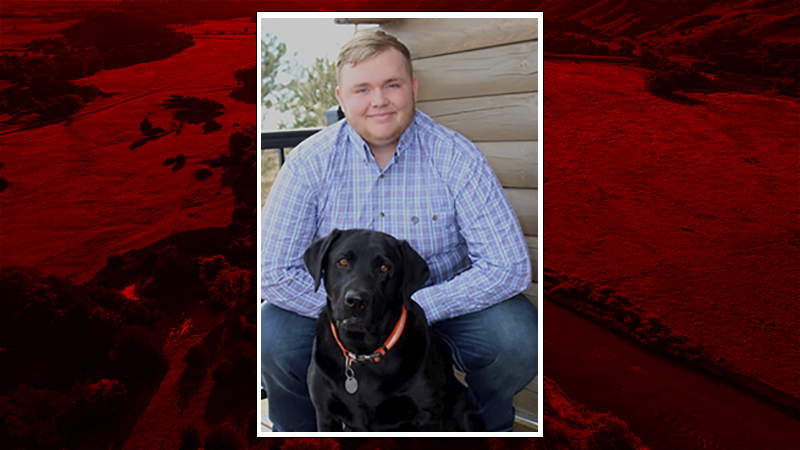
By Ronica Stromberg
Jarett Walter grew up in agriculture but has been earning a degree in natural resources and has noted a divide between the two career fields today. The University of Nebraska–Lincoln senior said he hopes to bridge it through work on the CASNR Student Advisory Board.
“Sometimes society in today's world likes to pit those two sides against each other, as if one can't survive the other, but in all reality, they're both important,” he said.
In his 21 years, he said he has seen people in our society in general have become less able to communicate civilly or work collaboratively with those they disagree with. He said he would like to improve his own communication skills and help others to regain the ability to agree to disagree and to compromise.
“I was forced to compromise with my younger siblings as a child,” he said. “If we expect our children to compromise, then why shouldn’t we expect the same from the adults? This board is an opportunity to better my ability to communicate with those I disagree with and foster an environment where others feel comfortable disagreeing. Our disagreements create a diversity of thought, and that’s part of what makes life so interesting.”
He stated part of his mission for already serving on the Student Advisory Board for about a year and a half as a member and its secretary has been to guide students to look past the misrepresentation they see in different news outlets about either agricultural or natural resources folks and recognize the two sides are not against each other but a team.
“I think that's something that's a beneficial perspective to bring to the board and really stick to this idea of cohesion between the two fields, because it's the College of Agricultural Sciences and Natural Resources,” he said. “I mean, it is both of them together, because together they're important and powerful.”
In short, people need food to survive and they need a healthy environment to grow food.
“I think that without natural resources, agriculture falls off, and without agriculture, some of our everyday commodities that we enjoy are gone,” he said. “And so, it's important that the two work together, and it doesn't have to be an either-or.”
A fisheries and wildlife major, Walter grew up on a 5,000-acre farm near McCook but said he originally came to college wanting to work for the Nebraska Game and Parks Commission or another nongovernmental organization. That goal changed, he said, when he realized there’s still a need for agriculture and there’s a need for agricultural leaders that are focused on natural resources and are continuing to fight for them.
“College has really helped me find that goal and what I want to do and the legacy I want to leave,” he said.
On the CASNR Student Advisory Board, he serves with 26 other students and their two advisors, Meg Kester and Fabio Mattos. From the School of Natural Resources, Katie Berck, Logan Greeno and Evvie Yendra also serve. The board works with the CASNR Dean’s Office to address student concerns in the college.
Walter and Berck said a good chunk of their work on the board over the past year has been on revising the Science Literacy 101 class all CASNR students are required to take. Walter said the board has been working with curriculum committees to revise the class to better suit what students want when they’re paying for this education. Berck said it can be challenging and intimidating for students to reach out to people above them and she has been proud of the board for carrying out those conversations.
Both students and Logan Greeno mentioned that serving on the board has given them opportunities to network at the university and fine-tune their leadership skills.
“I've always considered myself a pretty strong leader,” Walter said. “Something I've been working a lot to improve has been my advocating for various people or groups, and I think that this board has really allowed me to improve on advocating for others.”
Students come to him, he explained, and he is able to help them by voicing their concerns to the correct people to address them.
In the year and a half he has served on the board, he said the board has especially advocated for first-generation college students, international students without family or support nearby and students with people in their lives affected by cancer. Walter and others on the board have lost family members to cancer. At the board’s annual Husker Cancer Support Event, they recognize students and faculty members who have been affected by cancer. This year’s event took place on April 18 with Team Jack , a foundation to cure childhood brain cancer, also hosting.
He said the board focuses a lot on building community in CASNR by hosting such events where they can interact with students and let them know they are there for them.
“So, making sure we're ensuring this community for everyone, that we all have the place to share our own ideas, that we're capable of succeeding and that there are resources in place for that success,” he said.
He stated his own long-term plan for success as returning to the family farm to work with his younger brother on restarting the ranch operation and opening an outdoor education school. He expressed gratitude for the board allowing him to work with animal scientists, agronomists, forensic science students, a plant biology student and others.
“It's very rewarding to just know other people,” he said. “If my mission is to bridge this gap, I have to know where that bridge is supposed to connect, and so, being able to work with other groups and meet new people has been probably the most rewarding part of the board.”